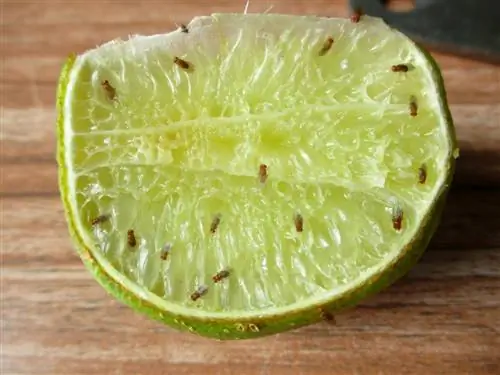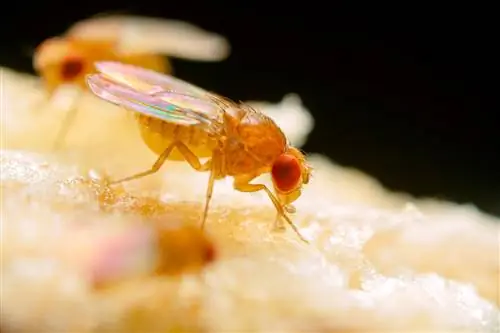- Author admin leonars@hobbygardeners.com.
- Public 2023-12-16 16:46.
- Last modified 2025-01-23 11:20.
Grandmothers used carnivorous plants like butterwort (Pinguicula) to rid the kitchen of annoying fruit flies or fungus gnats. Complete expulsion cannot be achieved, but the butterwort helps to keep the infestation within limits.

How does butterwort help with fruit flies?
Fedwort (Pinguicula) is a carnivorous plant that traps and digests fruit flies and other insects with sticky, enzyme-containing leaves. It can be placed in the kitchen or herb bed to reduce pests in a natural, non-toxic way.
This is how butterwort catches fruit flies and other insects
Fedwort forms leaves that are arranged in rosettes. There are small glands on the leaves that secrete a sticky liquid. Insects such as fruit flies and fungus gnats stick to this secretion.
The visitors captured in this way are digested by enzymes, so that after a few days only the chitin shells remain. The nutrients that Pinguicula gets from food are stored in the leaves.
In summer, fruit flies can often be found on herbs and fruit stored in the kitchen, so the butterwort is well supplied with meat. Although there are few insects in winter, the nutrients stored during the summer last until the next year.
Sedum in the kitchen to combat fruit flies
Fruit flies are particularly common in the kitchen near fruits, vegetables and herbs. By setting up pots with butterwort, you can keep the pests under control in a non-toxic way.
- Set up bright but not sunny
- Keep substrate moist
- do not fertilize
The biggest problem is the lighting conditions in the kitchen. Butterwort needs a lot of light, but does not like direct sunlight on the window. Place the potties near the window. You will achieve the greatest success if you place the butterwort between the fruit and vegetables.
The substrate must always be moist, especially in summer. In the worst case scenario, this can lead to mold forming in the kitchen.
Keep butterwort in the herb bed
Pests often spread in the herb bed in the garden. Butterwort is also a good solution for combating this.
Do not plant the butterwort directly in the soil so that you can better estimate the moisture needs of Pinguicula. Most herbs require rather dry soil, which is not suitable for butterwort.
Tip
Unlike many other carnivorous plants, Pinguicula is very easy to care for. Butterwort can also be grown in pots in places that are not too dry and does not require a moist habitat to thrive.






